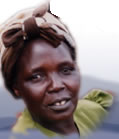THEMES IN THIS
TESTIMONY
Culture and Customs

Family Life

History

Identity

Click on arrows
to find more
testimonies
featuring
these themes
|
|
Sex
|
Male
|
|
|
Age
|
90
|
|
|
Identity
|
Sabaot
|
|
|
Occupation
|
Retired court judge
|
|
|
Location
|
Kapsokwony
|
|
|
Date
|
November 1996
|
|
summary
This is a short interview, but that is clear and concise with pertinent questions and long detailed answers. Unfortunately there is little about the narrator’s own life, which gives the interview overall less of a personal feeling. Yet Samuel does not shy away from expressing his opinions, and he seems to have a good memory. Samuel was also interviewed by another person (Elgon 40A), and there is more information about his life in that one. In this instance, he talks extensively about the history of the Sabaot, as well as the significance they put on traditional customs and the Mount Elgon environment. His explanations for polygamy and circumcision are particularly interesting.
“Polygamy was something very honourable during our time. In fact to gain recognition in the community one needed to be polygamous. Polygamy enhanced your status in the community and it also symbolised that you were a wealthy man. If you paid dowry for all your wives then you were a tough man. The people who were monogamous were ridiculed as being single-eyed and would not actually have a say in front of polygamous men.” But he recognises times are changing and the economic basis for polygamy is no longer viable: “I must admit that there is no room for polygamy now. First of all, there is no adequate land, which means that there is no livestock for dowry. Again bringing up a child right now is very expensive because many demands like education weigh down on the parent. Hence there is a need for people to cut down their families, and polygamy will mean many children. Another factor is that the ladies of this generation are a very jealous lot and therefore marrying many of them is equal to inviting trouble into your homestead.”
And about circumcision: “This is something that has been going on for a very long time. We've been circumcising both girls and boys from the beginning. A girl would not be married before she was circumcised. Circumcision for the boys was meant to enhance cleanliness and to inculcate bravery into a boy that was to grow into a warrior. But for the girls, circumcision was aimed at eradicating prostitution....This is a tradition that has served us well from the beginning and I see no reason why it should be wiped away.”
detailed breakdown
|
You will need a password from Panos to view the full
transcript of the interview. To apply for a password, click here.
Once you have a password, click here to go to the beginning
of the transcript. You can also click on any section of the
breakdown of content below and go straight to the
corresponding part of the transcript.
|
| Section 1-2 |
Long description of inter-tribal rivalry and events in the early 1900s.
|
| Section 2-3 |
Describes how he attended school on the chief’s insistence and left able to read and write which at that time was “not a mean feat”
|
| Section 3 |
Polygamy: before and today. The narrator has had eight wives because as an only child he was encouraged to have a large family to perpetuate the family name.
|
| Section 4 |
The importance of Mount Elgon to the Sabaot people. “This mountain is our home. We've lived here from the beginning.” How the name ‘Elgon’ originated from the name of a Sabaot sub-group. Also the importance of the forest as it provides them with plenty of resources.
|
| Section 5 |
Sabaot religion before Christianity.
Gender roles.
|
| Section 5-6 |
Circumcision. Interestingly, the narrator hasn’t had his boys circumcised because traditionally the circumcisers are Bukusu, and in periods of strife with the Bukusu, circumcisions are suspended.
|
| Section 6-7 |
Differences between the Sabaot and other Kalenjin groups.
How the Second World War was an opportunity for some Sabaot to see the world.
Independence and Sabaot involvement. |
|


